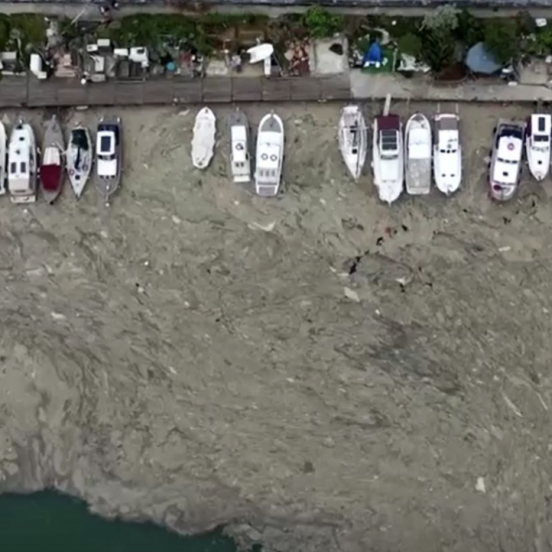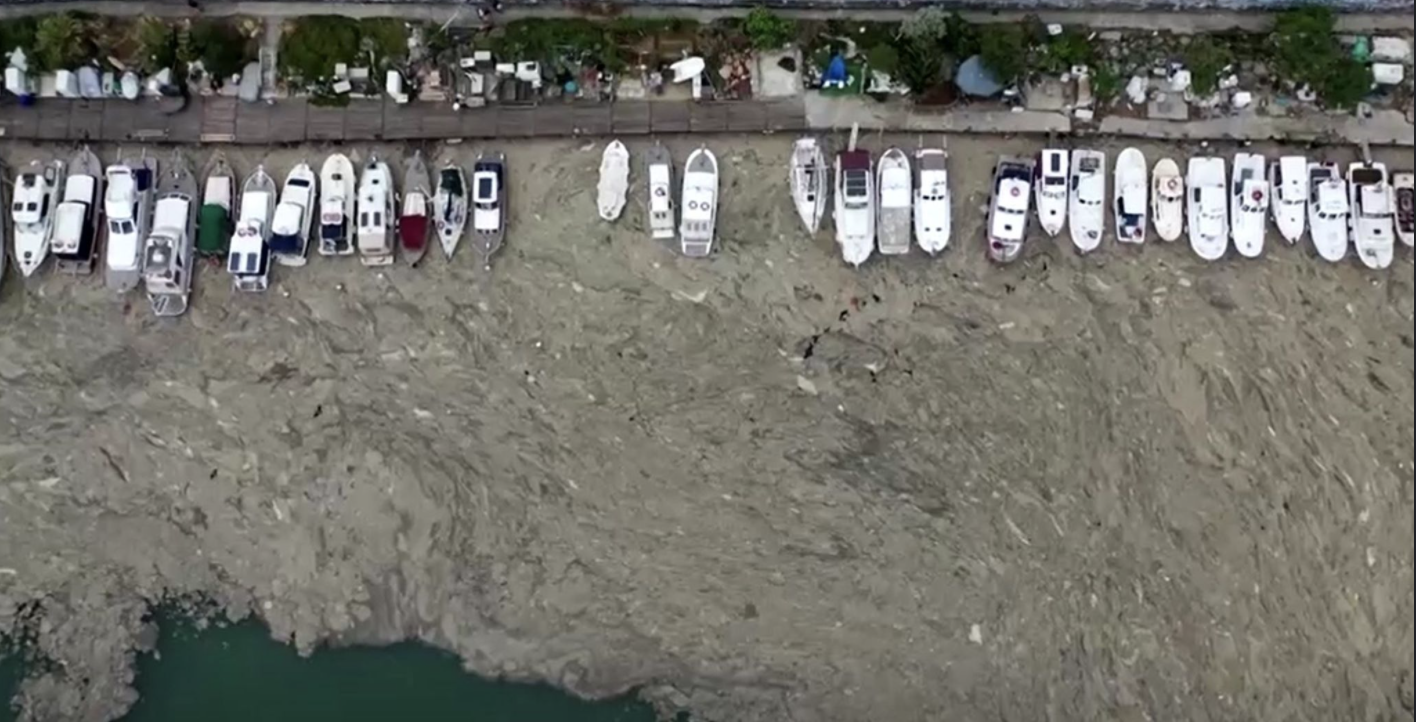Climate, Health and Equity Brief
Drought on land, peril at sea
June 17, 2021

The Climate, Health & Equity Brief is GMMB’s take on the week’s news on the current impacts of climate change. If you haven’t subscribed yet, you can do so by clicking here.
Hot Topic: Troubled waters. This week, a NASA report revealed that the planet now traps double the amount of heat it absorbed in 2005—signifying that we have reached an “unprecedented” imbalance between the energy the planet traps and what it radiates back into space. The troubling and multi-faceted impacts of planetary heating are currently on full display across the American West, with sweltering heat fueling intense drought conditions in more than a dozen states. Yet as bad as the situation is on land, it is the world’s oceans that absorb over 90 percent of the earth’s heat—and as temperatures rise, so do the consequences to sea life, marine-drive economies and entire ecosystems.
In the Mediterranean Sea, where scientists say ocean temperatures are increasing 20 percent faster than the global average, the economic impact is likely to be vast. Climate change puts an estimated $450 billion at risk in the region annually as the rising sea threatens communities, extreme weather harms coastal infrastructure, and thousands of new species invade the now tropically-warm waters.
In the nearby Sea of Marmara, which borders Turkey, a pervasive, mucus-like substance known as “sea snot” is wreaking havoc. The smelly muck, which reaches depths of 100 feet in some places, is produced by microorganisms thriving on wastewater runoff into an increasingly warming ocean. The result is suffocating marine life, accumulating viruses and bacteria, reduced oxygen in the water, and a grave threat to the livelihoods of fishermen along Istanbul’s coast.
And the impacts of water warming on economies and ecosystems aren’t limited to oceans. In the Klamath River, located along a Yurok Tribe’s reservation, warming waters and low water levels have created a breeding ground for a parasite that has now killed more than half the river’s juvenile salmon. Parasites thrive in warm waters and drought-like conditions, but they are also easily spread by plastic debris. Rafts of increasingly pervasive plastic waste drift across bodies of water, transporting marine species and potentially harmful and invasive microorganisms to new regions along with the flotsam.
As summer begins and temperatures rise, people across the globe are flocking to nearby bodies of water to beat the heat of inland life. Unfortunately, our waterways and shores are increasingly plagued with problems resulting from unchecked pollution and rapidly rising temperatures. Our reliance on fossil fuels and the enjoyment and sustenance we receive from our oceans and rivers are connected—and we cannot continue to have both. To protect the waters we hold dear, we must reduce the fossil-fuel byproducts that are warming and polluting our planet before it’s too late.
— Matt & Traci, GMMB
Human Health
The drought in the Western United States is at its most extreme in 20 years with the worst yet to come, causing a shrinking water supply for tens of millions of residents and for farmlands that produce much of the country’s fruits and vegetables. (The New York Times, NPR)
Despite temperatures not expected to peak until July, some cities in the Middle East have already exceeded 122°F, fueling concerns that some regions could become uninhabitable for several months per year within the next few decades. (Axios)
As extreme heat becomes more common, a new report details the severe lack of protections for farmworkers, who die of heat-related causes at a rate 20 times higher than those in other professions. (Civil Eats)
Planetary Health
Turkey has launched an unprecedented effort to clear the invasion of ‘sea snot’—or a pollution and temperature-driven overgrowth of phytoplankton—which is choking marine life and has disrupted tourism and the fishing industry, both of which support communities living along the Sea of Marmara. (Daily Sabah)
The increased presence of plastics in the ocean has enabled “mass rafting,” allowing invasive disease-carrying species to travel to new regions, further straining ecosystems that are already weakened by pollution. (The Guardian)
A new report revealed that atmospheric carbon dioxide levels reached a new global high last month—driven mostly by the continued use of coal and a resurgence in industrial activity—and that emissions are currently on track to rise at their second-fastest pace ever this year. (The New York Times)
The greatest danger to our planet is the belief that someone else will save it.”
– Robert Swan
Equity
A new analysis revealed that FEMA disaster relief given to Black neighborhoods is on average five to ten percent less than what is given to white neighborhoods despite a separate analysis which found that low-income communities and communities of color are most likely to live in areas that face disproportionate extreme weather risks. (The New York Times, Forbes)
Hundreds of thousands of young salmon which support Yurok Tribe businesses and fishermen in Northern California are dying off at alarming rates in the Klamath River as low water levels driven by drought cause predatory parasites to thrive. (SF Gate)
A new report found that due to a lack of charging infrastructure in low-income neighborhoods, EV pilots for ride-sharing services disproportionately serve wealthier communities, exacerbating vehicle-based emissions inequalities based on financial status. (Bloomberg)
Hundreds of activists in Minnesota are protesting Enbridge’s attempt to replace a pipeline running from Canada to Wisconsin, citing environmental concerns and risks to Native American lands for hunting and harvesting. (AP News)
Politics & Economy
A new study revealed that G7 countries could lose up to $5 trillion in GDP by 2050—twice as much as economies lost due to the pandemic—unless they commit to sufficiently addressing climate change. (CTV News)
Although G7 leaders pledged to cut global emissions in half by 2030, they failed to specify an end date for the use of coal or commit additional funding for climate mitigation in developing countries. (The New York Times)
Scientists warn that the Mediterranean Sea, which employs more than 180,000 people and has a collective worth of more than $3 billion, is rapidly undergoing tropicalization as its temperature rises 20 percent faster than the global average. (Our Daily Planet)
Action
Following years of legal battles and protests from Indigenous and environmental activists, the Keystone XL Pipeline has officially been cancelled after Canadian officials failed to persuade the Biden administration to reverse its permit cancellation. (AP News)
Unions in California that represent thousands of oil workers endorsed a new report that predicts the state could reduce pollution by 50% in the next decade by investing in clean energy jobs and helping current fossil fuel workers transition to the clean energy industry. (The Los Angeles Times)
A new Energy Earthshots Initiative announced by the Department of Energy will seek to lower clean hydrogen costs by 80 percent as a means to work towards the nation’s net zero goal by 2050. (Our Daily Planet)
Kicker
Understanding the climate crisis is tough. Check out these five podcasts to explore the threats facing the planet along with potential solutions.
The GMMB Climate, Health & Equity Brief would not be possible without the contributions of the larger GMMB California team—Aaron Benavides, Elke Cortes, Stefana Simonetto and Sydney Lykins. Feedback on the Brief is welcome and encouraged and should be sent to CHandEBrief@gmmb.com.






